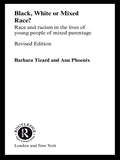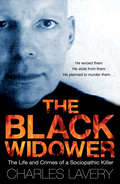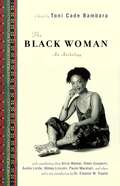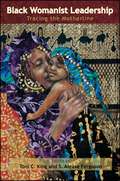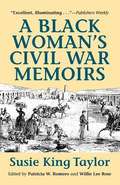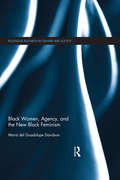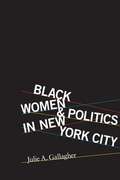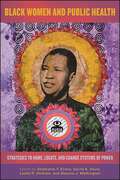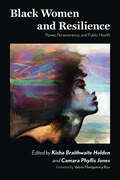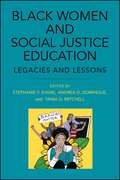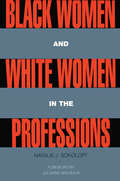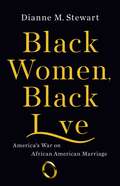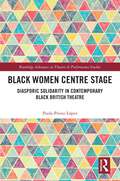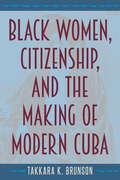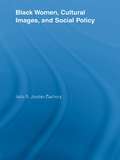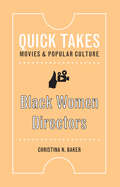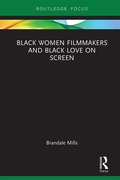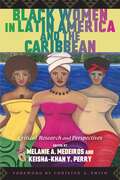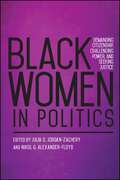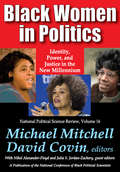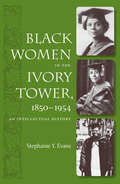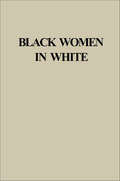- Table View
- List View
Black, White or Mixed Race?: Race and Racism in the Lives of Young People of Mixed Parentage
by Ann Phoenix Barbara TizardThe number of people in racially mixed relationships has grown steadily over the last thirty years, yet these people often feel stigmatised and unhappy about their identities. The first edition of Black, White or Mixed Race? was a ground-breaking study: this revised edition uses new literature to consider what is now known about racialised identities and changes in the official use of 'mixed' categories. All new developments are placed in a historical framework and in the context of up-to-date literature on mixed parentage in Britain and the USA. Based on research with young people from a range of social backgrounds the book examines their attitudes to black and white people; their identity; their cultural origins; their friendships; their experiences of racism. This was the first study to concentrate on adolescents of black and white parentage and it continues to provide unique insights into their identities. It is a valuable resource for all those concerned with social work and policy.
The Black Widower: The Life and Crimes of a Sociopathic Killer
by Charles LaveryHe drugged his first wife and staged a fireball car crash, collecting a £200,000 insurance payout.He cheated his second wife of her life savings and attempted to kill her in a copycat crash.He faked cancer to dupe his third victim into a bigamous marriage, plotting her murder to steal her inheritance.He is Malcolm Webster: The Black Widower.After seventeen years of deception and brutality, Webster was finally jailed for thirty years in July 2011 at the climax of one of the longest trials in Scottish legal history. In this chilling book, award-winning journalist Charles Lavery documents the Black Widower’s life and crimes, giving a compelling insight into the mind of a man who killed for money and attempted to cover his tracks with drugs and fire.
The Black Woman: An Anthology
by Toni Cade Bambara Eleanor W TraylorA collection of early, emerging works from some of today's most celebrated African American female writers When it was first published in 1970, The Black Woman introduced readers to an astonishing new wave of voices that demanded to be heard. In this groundbreaking volume of original essays, poems, and stories, a chorus of outspoken women -- many who would become leaders in their fields: bestselling novelist Alice Walker, poets Audre Lorde and Nikki Giovanni, writer Paule Marshall, activist Grace Lee Boggs, and musician Abbey Lincoln among them -- tackled issues surrounding race and sex, body image, the economy, politics, labor, and much more. Their words still resonate with truth, relevance, and insight today.
Black Womanist Ethics
by Katie G. CannonThis study articulates the distinctive moral character of the Afro-American women's community. Beginning with a reconstructive history of the Afro-American woman's situation in America, Katie G. Cannon goes on to trace the emergence of the Black woman's literary tradition and explain its importance in expressing the moral wisdom of Black women. The life and work of Zora Neale Hurston are examined in detail for her unique contributions to the moral tradition of the Afro-American woman. A final chapter initiates a promising exchange between the works of Hurston and those of Howard Thurman and Martin Luther King, Jr.
Black Womanist Leadership: Tracing the Motherline
by Toni C. King S. Alease FergusonFeaturing the stories of fourteen Black women scholars, Black Womanist Leadership: Tracing the Motherline offers a culturally based model of Black women's leadership practices, and examines the mother-daughter transmission of these skills. The personal narratives fit into a storytelling tradition that reveals the ways Black mothers and women of the community—the Motherline—teach girls the "ways women lead." The essays present a range of different practical and theoretical issues of leadership and development, including mother nurture, emulation of and divergence from core values, internalized oppression, self determination, representation of the physical self, guardianship/governance of the body, cooperative economics, activism, contentiousness with or differentiation from the mother, and negotiation of leadership across public and private spheres. Together, they make a compelling argument for the necessity of continuing to teach the cultural and gender-specific resistance to oppression that has been passed along the Motherline, and to adapt this Motherline tradition to the lives and needs of women and girls in the 21st century.
Black Woman's Civil War Memoirs: Reminiscences of My Life in Camp with the 33rd U.S. Colored Troops, Late 1st South Carolina Volunteers
by Susie King Taylor Patricia CornwallSusie King Taylor was a black, newly freed nurse during the Civil War. Her memoirs present Civil War and Reconstruction history. Patricia Cornwall does an excellent job of editing and providing historical notes. Willie Lee Rose's introduction provides background and perspective. This textbook is easy enough to read.
Black Women against the Land Grab: The Fight for Racial Justice in Brazil
by Keisha-Khan Y. PerryIn Brazil and throughout the African diaspora, black women, especially poor black women, are rarely considered leaders of social movements let alone political theorists. But in the northeastern city of Salvador, Brazil, it is these very women who determine how urban policies are established. Focusing on the Gamboa de Baixo neighborhood in Salvador&’s city center, Black Women against the Land Grab explores how black women&’s views on development have radicalized local communities to demand justice and social change. In Black Women against the Land Grab, Keisha-Khan Y. Perry describes the key role of local women activists in the citywide movement for land and housing rights. She reveals the importance of geographic location for understanding the gendered aspects of urban renewal and the formation of black women–led social movements. How have black women shaped the politics of urban redevelopment, Perry asks, and what does this kind of political intervention tell us about black women&’s agency? Her work uncovers the ways in which political labor at the neighborhood level is central to the mass mobilization of black people against institutional racism and for citizenship rights and resources in Brazil. Highlighting the political life of black communities, specifically those in urban contexts often represented as socially pathological and politically bankrupt, Black Women against the Land Grab offers a valuable corrective to how we think about politics and about black women, particularly poor black women, as a political force.
Black Women, Agency, and the New Black Feminism (Routledge Research in Gender and Society)
by Maria del DavidsonThe powerful Beyoncé, formidable Rihanna, and the incalculable Nikki Minaj. Their images lead one to wonder: are they a new incarnation of black feminism and black women’s agency, or are they only pure fantasy in which, instead of having agency, they are in fact the products of the forces of patriarchy and commercialism? More broadly, one can ask whether black women in general are only being led to believe that they have power but are really being drawn back into more complicated systems of exploitation and oppression. Or, are black women subverting patriarchy by challenging notions of their subordinate and exploitable sexuality? In other words, ‘who is playing who’? Black Women, Agency, and the New Black Feminism identifies a generational divide between traditional black feminists and younger black women. While traditional black feminists may see, for example, sexualized images of black women negatively and as an impediment to progress, younger black women tend to embrace these new images and see them in a positive light. After carefully setting up this divide, this enlightening book will suggest that a more complex understanding of black feminist agency needs to be developed, one that is adapted to the complexities faced by the younger generation in today’s world. Arguing the concept of agency as an important theme for black feminism, this innovative title will appeal to scholars, teachers, and students interested in black feminist and feminist philosophy, identity construction, subjectivity and agency, race, gender, and class.
Black Women and International Law
by Jeremy I. LevittFrom Compton to Cairo, Bahia to Brixton, black women have been disproportionally affected by poverty, illiteracy, unemployment, discrimination and violence. Despite being one of the largest and geographically dispersed groups in the world, they are rarely referenced or considered as a subject of analysis in international law literature. Thus, it is vital that scholars refashion global discourse by re-conceptualizing international law and relations from their unique experiences and perspectives. This collection covers a broad range of topics and issues that examine the complex interactions - as subjects and objects - between black women and international law. The book critically explores the manifold relationship between them with a view toward highlighting the historic and contemporary ways in which they have influenced and been influenced by transnational law, doctrine, norms, jurisprudence, public policy, public discourse and global governance. It purports to unearth old law and fashion new paradigms born out of the experiences of black women.
Black Women and Politics in New York City (Women, Gender, and Sexuality in American History)
by Julie A. GallagherJulie A. Gallagher documents six decades of politically active black women in New York City who waged struggles for justice, rights, and equality not through grassroots activism but through formal politics. In tracing the paths of black women activists from women's clubs and civic organizations to national politics--including appointments to presidential commissions, congressional offices, and even a presidential candidacy--Gallagher also articulates the vision of politics the women developed and its influence on the Democratic party and its policies. Deftly examining how race, gender, and the structure of the state itself shape outcomes, she exposes the layers of power and discrimination at work in all sectors of U.S. society.
Black Women and Public Health: Strategies to Name, Locate, and Change Systems of Power (SUNY series in Black Women's Wellness)
by Stephanie Y. Evans Sarita K. Davis Leslie R. Hinkson Deanna J. Wathington2022 CHOICE Outstanding Academic TitleBlack Women and Public Health creates an urgently needed interdisciplinary dialogue about issues of race, gender, and health. An enduring history of racism, sexism, and dehumanization of Black women's bodies has largely rendered the health needs of the Black community inaudible and invisible. Grounded in the lived experiences and expertise of Black women, this collection bridges gaps between researchers, practitioners, educators, and advocates. Black women's public health work is a regenerative practice—one that looks backward, inward, and forward to improve the quality of life for Black communities in the United States and beyond. The three dozen authors in this volume offer analysis, critique, and recommendations for overcoming longstanding and contemporary challenges to equity in public health practices.
Black Women and Resilience: Power, Perseverance, and Public Health (SUNY series in Black Women's Wellness)
by Kisha Braithwaite Holden; Camara Phyllis Jones; Valerie Montgomery RiceBlack Women and Resilience brings together a wealth of qualitative and quantitative research to help foster broad understanding and advancement of Black women's collective health and wellbeing. Throughout, Kisha Braithwaite Holden, Camara Phyllis Jones, and their contributors use a health equity lens, maintaining that achieving health equity requires valuing all individuals and populations equally, recognizing and rectifying historical injustices, and providing resources according to need. Across four sections, scholars, practitioners, and community leaders address cultural narratives of Black womanhood; significant health issues affecting Black women; trauma, stressors, and strategies for healing; and advocacy for social justice and collective action. Multivocal and multidisciplinary, Black Women and Resilience models and invites exchange across sectors and specializations while consistently centering the experiences and contributions of Black women as catalysts for transformation.
Black Women and Social Justice Education: Legacies and Lessons (SUNY series, Praxis: Theory in Action)
by Stephanie Y. Evans; Andrea D. Domingue; Tania D. MitchellBlack Women and Social Justice Education explores Black women's experiences and expertise in teaching and learning about justice in a range of formal and informal educational settings. Linking historical accounts with groundbreaking contributions by new and rising leaders in the field, it examines, evaluates, establishes, and reinforces Black women's commitment to social justice in education at all levels. Authors offer resource guides, personal reflections, bibliographies, and best practices for broad use and reference in communities, schools, universities, and nonprofit organizations. Collectively, their work promises to further enrich social justice education (SJE)—a critical pedagogy that combines intersectionality and human rights perspectives—and to deepen our understanding of the impact of SJE innovations on the humanities, social sciences, higher education, school development, and the broader professional world. This volume expands discussions of academic institutions and the communities they were built to serve.
Black Women and White Women in the Professions: Occupational Segregation by Race and Gender, 1960-1980 (Perspectives on Gender)
by Natalie J. SokoloffFirst published in 1992. Routledge is an imprint of Taylor & Francis, an informa company.
Black Women, Black Love: America's War on African American Marriage
by Dianne M StewartIn this analysis of social history, examine the complex lineage of America's oppression of Black companionship.According to the 2010 US census, more than seventy percent of Black women in America are unmarried. Black Women, Black Love reveals how four centuries of laws, policies, and customs have created that crisis.Dianne Stewart begins in the colonial era, when slave owners denied Blacks the right to marry, divided families, and, in many cases, raped enslaved women and girls. Later, during Reconstruction and the ensuing decades, violence split up couples again as millions embarked on the Great Migration north, where the welfare system mandated that women remain single in order to receive government support. And no institution has forbidden Black love as effectively as the prison-industrial complex, which removes Black men en masse from the pool of marriageable partners.Prodigiously researched and deeply felt, Black Women, Black Love reveals how white supremacy has systematically broken the heart of Black America, and it proposes strategies for dismantling the structural forces that have plagued Black love and marriage for centuries.
Black Women Centre Stage: Diasporic Solidarity in Contemporary Black British Theatre (Routledge Advances in Theatre & Performance Studies)
by Paola Prieto LópezThis book examines the political alliances that are built across the diaspora in contemporary plays written by Black women playwrights in the UK. Through the concept of creative diasporic solidarity, it offers an innovative theoretical approach to examine the ways in which the playwrights respond creatively to the violence and marginalisation of Black communities, especially Black women. This study demonstrates that theatre can act as a productive space for the ethical encounter with the Other (understood in terms of alterity, as someone different from the self) by examining the possibilities of these plays to activate the spectators’ responsibility and solidarity towards different types of violence experienced by Black women, offering alternative modes of relationality. The book engages with a range of contemporary works written by Black women playwrights in the UK, including Mojisola Adebayo, Theresa Ikoko, Diana Nneka Atuona, Gloria Williams, Charlene James, or Yusra Warsama, bringing to the fore a gendered and intersectional approach to the analysis of the texts. This book will be of great interest to students and scholars in contemporary theatre, gender studies and diaspora studies.
Black Women, Citizenship, and the Making of Modern Cuba
by Takkara K. BrunsonIlluminating the activism of Black women during Cuba’s prerevolutionary periodAssociation of Black Women Historians Letitia Woods Brown Book PrizeIn Black Women, Citizenship, and the Making of Modern Cuba, Takkara Brunson traces how women of African descent battled exclusion on multiple fronts and played an important role in forging a modern democracy. Brunson takes a much-needed intersectional approach to the political history of the era, examining how Black women’s engagement with questions of Cuban citizenship intersected with racial prejudice, gender norms, and sexual politics, incorporating Afro-diasporic and Latin American feminist perspectives. Brunson demonstrates that between the 1886 abolition of slavery in Cuba and the 1959 Revolution, Black women—without formal political power—navigated political movements in their efforts to create a more just society. She examines how women helped build a Black public sphere as they claimed moral respectability and sought racial integration. She reveals how Black women entered into national women’s organizations, labor unions, and political parties to bring about legal reforms. Brunson shows how women of African descent achieved individual victories as part of a collective struggle for social justice; in doing so, she highlights how racism and sexism persisted even as legal definitions of Cuban citizenship evolved.
Black Women, Cultural Images, and Social Policy (Routledge Studies in North American Politics #Vol. 2)
by Julia S. Jordan-ZacheryThis book examines the racing-gendering process of policy making to show how relations of power and forms of inequality are discursively constructed and impact the lives of African American women.
Black Women Directors (Quick Takes: Movies and Popular Culture)
by Christina N. BakerBlack women have long recognized the power of film for storytelling. For far too long, however, the cultural and historical narratives about film have not accounted for the contributions of Black women directors. This book remedies this omission by highlighting the trajectory of the culturally significant work of Black women directors in the United States, from the under-examined pioneers of the silent era, to the documentarians who sought to highlight the voices and struggles of Black women, and the contemporary Black women directors in Hollywood. Applying a Black feminist perspective, this book examines the ways that Black women filmmakers have made a way for themselves and their work by resisting the dominant cultural expectations for Black women and for the medium of film, as a whole.
Black Women Filmmakers and Black Love on Screen (Routledge Transformations in Race and Media)
by Brandale N. MillsThis book offers a thorough analysis of how romantic love between Black men and women (referred to here as Black Love) is portrayed in Hollywood films, specifically from the perspective of Black female filmmakers. Using historical and contemporary images of Black female representation in the media as a foundation, the main themes of this text focus on the male gazes’ influence on Hollywood narratives, the necessity for the Black female perspective in Hollywood, and that perspective’s influence on ideologies and narratives.
Black Women in Latin America and the Caribbean: Critical Research and Perspectives
by Julia S. Abdalla Angela Crumdy Bruna Cristina Pereira Ishan Gordon-Ugarte Castriela E. Hernández Reyes Eshe E. Lewis Cristiano Dos Rodrigues Edilza Correia Sotero Maziki Thame Melanie WhiteBlack Women in Latin America and the Caribbean: Critical Research and Perspectives employs an intersectional and interdisciplinary approach to examine Black cisgender women’s social, cultural, economic, and political experiences in Latin America and the Caribbean. It presents critical empirical research emphasizing Black women’s innovative, theoretical, and methodological approaches to activism and class-based gendered racism and Black politics. While there are a few single-authored books focused on Black women in Latin American and Caribbean, the vast majority of the scholarship on Black women in Latin America and the Caribbean has been published as theses, dissertations, articles, and book chapters. This volume situates these social and political analyses as interrelated and dialogic and contributes a transnational perspective to contemporary conversations surrounding the continued relevance of Black women as a category of social science inquiry. Many of the contributing authors are from Latin American and Caribbean countries, reflecting a commitment to representing the valuable observations and lived experiences of scholars from this region. When read together, the chapters offer a hemispheric framework for understanding the lasting legacies of colonialism, transatlantic slavery, plantation life, and persistent socio-economic and cultural violence.
Black Women in Politics: Demanding Citizenship, Challenging Power, and Seeking Justice (SUNY series in African American Studies)
by Julia S. Jordan-Zachery; Nikol G. Alexander-FloydThis book explores how Diasporic Black women engage in politics, highlighting three dimensions—citizenship, power, and justice—that are foundational to intersectionality theory and politics as developed by Black women and other women of color. By extending beyond particular time periods, locations, and singular definitions of politics, Black Women in Politics sets itself apart in the field of women's and gender studies in three ways: by focusing on contemporary Black politics not only in the United States, but also the African Diaspora; by showcasing politics along a broad trajectory, including social movements, formal politics, public policy, media studies, and epistemology; and by including a multidisciplinary range of scholars, with a strong concentration of work by political scientists, a group whose work is often excluded or limited in edited collections. The final result expands our repertoire of methodological tools and concepts for discussing and assessing Black women's lives, the conditions under which they live, their labor, and the politics they enact to improve their circumstances.
Black Women in Politics: Identity, Power, and Justice in the New Millennium (National Political Science Review Series)
by Michael MitchellThe research included in this volume examines the competing pressures felt by black women as political agents in the domains of elections, public policy, and social activism. Their challenges and initiatives are explored in public spaces, institutional behaviours, and public policy.The volume features cutting-edge research exploring black women's political engagement. The first group of contributors interrogates the treatment of black women within the discipline of political science. The second group examines the relationship between cultural politics and policymaking. The third and final group outlines the politics of race-gendered identity and black feminist practice.Black Women in Politics includes chapters on black leadership, radical versus moderate politics in New Orleans, and the Shelby vs. Holder Supreme Court decision. The editors introduce a new series highlighting trends in black politics. Finally, the work notes the passing of William (Nick) Nelson and Hanes Walton, Jr., prominent members of the National Conference of Black Political Scientists.
Black Women in the Ivory Tower, 1850-1954: An Intellectual History
by Stephanie Y. Evans"Provides scholars with a historical lens from which to view the higher education of black women . . . [and] how one generation of black women benefited from the work and sacrifices of the prior generation."--Adah L. Ward Randolph, Ohio University "Keen historical and theoretical observation of African American women's relationship to educational institutions in the United States."--Heidi Lasley Barajas, University of Minnesota Evans chronicles the stories of African American women who struggled for and won access to formal education, beginning in 1850, when Lucy Stanton, a student at Oberlin College, earned the first college diploma conferred on an African American woman. In the century between the Civil War and the civil rights movement, a critical increase in black women's educational attainment mirrored unprecedented national growth in American education. Evans reveals how black women demanded space as students and asserted their voices as educators--despite such barriers as violence, discrimination, and oppressive campus policies--contributing in significant ways to higher education in the United States. She argues that their experiences, ideas, and practices can inspire contemporary educators to create an intellectual democracy in which all people have a voice. Among those Evans profiles are Anna Julia Cooper, who was born enslaved yet ultimately earned a doctoral degree from the Sorbonne, and Mary McLeod Bethune, founder of Bethune-Cookman College. Exposing the hypocrisy in American assertions of democracy and discrediting European notions of intellectual superiority, Cooper argued that all human beings had a right to grow. Bethune believed that education is the right of all citizens in a democracy. Both women's philosophies raised questions of how human and civil rights are intertwined with educational access, scholarly research, pedagogy, and community service. This first complete educational and intellectual history of black women carefully traces quantitative research, explores black women's collegiate memories, and identifies significant geographic patterns in America's institutional development. Evans reveals historic perspectives, patterns, and philosophies in academia that will be an important reference for scholars of gender, race, and education. Stephanie Y. Evans is assistant professor in the African American Studies Program and Center for Women's Studies and Gender Research at the University of Florida.
Black Women in White: Racial Conflict And Cooperation In The Nursing Profession, 1890-1950 (Blacks in the Diaspora #No.529)
by Darlene Clark Hine" . . . pioneering. . . . This history, as Hine vividly depicts it, sheds light on the development of African-American professionals and offers as well the opportunity to analyze the intersection of race and gender." —The Nation" . . . well-researched and innovative . . . Highly recommended." —Library Journal"The book is full of poignant and sympathetic portraits of black nurses in their dedication and idealism, in their pain and anger at the relentless contempt of white nurses and in their deep concern for their community's health needs. . . . Hine has brilliantly fulfilled an aim other historians have neglected . . . " —The Women's Review of Books"This well-researched book adds breadth and depth to the existing literature on the educational and professional history of black nurses, including the development of black hospitals and training schools in the US. . . . Highly recommended." —Choice" . . . an important book not only because it is a serious effort to analyze nursing history in the context of American racism but also because it offers a vantage point on the experiences of black women at work." —Medical Humanities Review"Darlene Clark Hine has written a thoughtful analysis of the struggles of African Americans striving for professional status and recognition. . . . an illuminating study of the interaction of race and gender in the construction of a professional identity." —The Journal of American HistoryThis pathbreaking study analyzes the impact of racism on the development of the nursing profession, particularly on black women in the profession, during the first half of this century. Hine uncovers shameful episodes in nursing history and probes the nature and extent of racial conflict and cooperation in the profession.
